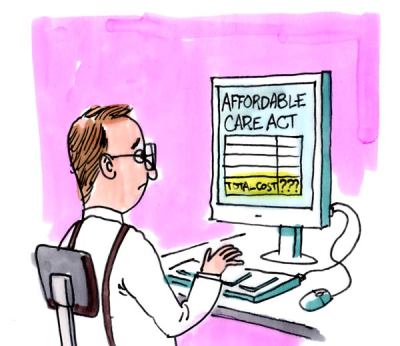Survival Prospects For ObamaCare in 2015

Now that Republicans have control of Congress, they could possibly keep their promise to repeal ObamaCare—except for two immediate obstacles. One of course is the threat of the Presidential veto. Another is the already apparent willingness of craven politicians to surrender pre-emptively.
Once a government benefit is given, it becomes politically suicidal to take it back—at least in a way that people can see. There are likely a million or more Americans who are reveling in "having healthcare for the first time in their lives." Or so the Administration's messaging would have us believe. People are not yet onto the difference between having an insurance card and getting prompt medical attention. It may be years before a new beneficiary develops a serious illness and finds out that his policy is worthless. But he will know immediately if his subsidy is taken away, and the plan demands several hundred dollars every month. And the media will be on it instantly.
Lots of articulate and influential people are making out well: navigators, consultants, administrators, insurance plans, some doctors and hospitals. They don't want to lose their benefits either. Every dollar that the government takes from a taxpayer is income to somebody.
But as the costs start to be felt, and certain sweeteners expire, the question may well be not "can ObamaCare be repealed?" but "can it be implemented?"
"Fannie Med" is beginning to implode. One taxpayer-backed insurance "co-op" is heading into bankruptcy in Iowa and Nebraska. As nonprofits, co-ops are not subject to accountability to shareholders, and have tended to underprice their products. They may try to game ObamaCare rules, undercutting competitors to capture market share, likely driving normal insurers out of the market. When revenues fail to cover obligations, they count on ObamaCare's reinsurance and risk-corridor safety nets. But these benefits are limited and will expire.
CoOpportunity Health cut it too close. Any competitors that it displaced may be gone forever.
The Department of Health and Human Services poured $1.9 billion into two dozen co-ops now responsible for 450,000 Americans. What happens when the government fails as venture capitalist? Taxpayers take the loss. And what happens to its subscribers when an insurer runs out of money?
Millions of Americans are supposed to get coverage through expansion of Medicaid. But the bait-and-switch tactic is being exposed. The federal government promised to cover 100 percent of the additional costs—at first. In 2017, the support is cut to 95 percent, and by 2020 to 90 percent. That may still sound generous, but states will be hard pressed to come up with 10s or 100s of millions of dollars—$78 million for little Utah.
And who will see the patients? Primary-care physicians got a temporary (two year) fee boost of about 40 percent, funded by $5.6 billion from the federal government. As this runs out, some doctors will see pay cuts of more than 47 percent if states don't take up the slack. Maybe doctors will have to continue caring for current patients, lest they be accused of abandonment, but will they accept new Medicaid patients?
Come April, Americans will be having to tell the IRS about their insurance status, and pay an additional "tax" if it doesn't meet requirements. Employers face onerous new reporting requirements come New Year's Day, and the delayed employer mandate kicks in. But at least the economic outlook is rosy, right?
The economy purportedly "grew" by $140 billion in the third quarter of 2014—through what has been called "fabricated fudging." At the same time, Americans became $80 billion poorer. How did that happen? Americans dug into their savings and spent billions on the "Affordable" Care Act.
And here is where ObamaCare, like mistletoe growing on a tree, may reach its limit. Already, some 25 percent of the uninsured are choosing not to enroll, preferring the tax to the premiums. What happens when people simply cannot pay? How much more can ObamaCare bleed from taxpayers, productive businesses, and Americans who are not yet destitute? And what happens when the medical system can sustain the load no longer?
ObamaCare can't survive if the economy doesn't. Is there no other way to free our country from this and other government overgrowth?




























